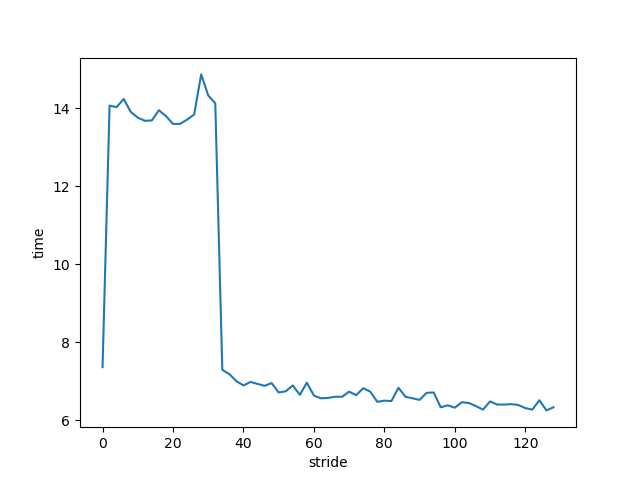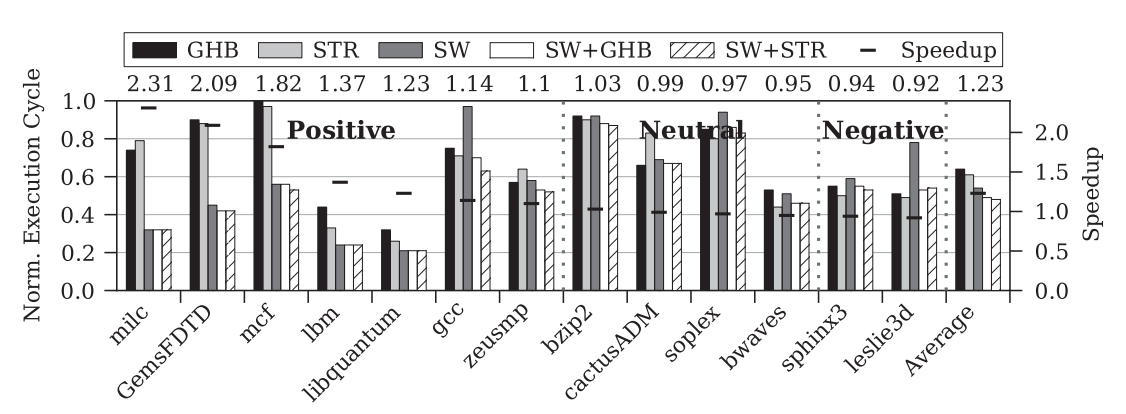GCC Prefetch
Table of Contents
1. GCC Prefetch
When Prefetching Works, When It Doesn’t, and Why
The Intel® 64 and IA-32 Architectures Optimization Reference Manual
prefetch 可以隐藏内存访问的 latency. 例如 eigen 的 gebp kernel 就使用了 __builtin_prefetch 来提高 GEMM 性能.
当 backend 支持特定的 prefetch 指令时, gcc 可以:
- 使用 pass_loop_prefetch 进行 auto prefetch
- 使用 profile 进行 auto prefetch
- 使用 __builtin_prefetch 进行 manual prefetch
1.1. benchmark
1.1.1. bisect 测试
为了测试 prefetch 指令对性能的影响, 需要设计一个特殊的测试代码, 以便减小编译器的 insn schedule, hardware out-of-order 以及 hardware prefetch 等对结果造成的影响. 例如为了减少 hardware prefetch 的影响, 需要避免在代码中顺序访问内存.
二分查找 (bisect) 是一个比较合适的测试程序
https://stackoverflow.com/questions/7327994/prefetching-examples
#include <stdio.h> #include <stdlib.h> #include <time.h> int bisect(int *d, int N, int key) { int lo = 0; int hi = N; int mid = 0; while (lo < hi) { mid = (lo + hi) / 2; #ifdef DO_PREFETCH __builtin_prefetch(&d[(mid + 1 + hi) / 2], 0, 1); __builtin_prefetch(&d[(lo + mid) / 2], 0, 1); #endif if (d[mid] == key) { return mid; } if (d[mid] < key) { lo = mid + 1; } else { hi = mid; } } return -1; } int main() { int N = 1024 * 1024 * 512; int *data = malloc(N * sizeof(int)); for (int i = 0; i < N; i++) { data[i] = i; } int N_LOOKUPS = 1024 * 1024 * 8; srand(0); int *lookups = malloc(N_LOOKUPS * sizeof(int)); for (int i = 0; i < N_LOOKUPS; i++) { lookups[i] = rand() % N; } for (int i = 0; i < N_LOOKUPS; i++) { bisect(data, N, lookups[i]); } free(data); free(lookups); }
在 `Intel(R) Core(TM) i5-10210U CPU @ 1.60GHz` 上测试结果为:
$> gcc prefetch.c -DDO_PREFETCH -o with-prefetch -std=c11 -O3
$> gcc prefetch.c -o no-prefetch -std=c11 -O3
$> perf stat -e branch-misses,branches,L1-dcache-load-misses,L1-dcache-loads ./with-prefetch
Performance counter stats for './with-prefetch':
5,821,103 branch-misses # 0.51% of all branches (74.99%)
1,149,572,392 branches (74.99%)
522,814,225 L1-dcache-load-misses # 35.37% of all L1-dcache accesses (75.03%)
1,478,028,379 L1-dcache-loads (75.00%)
8.620298468 seconds time elapsed
8.103417000 seconds user
0.515962000 seconds sys
$> perf stat -e branch-misses,branches,L1-dcache-load-misses,L1-dcache-loads ./no-prefetch
Performance counter stats for './no-prefetch':
120,983,504 branch-misses # 8.11% of all branches (74.99%)
1,491,848,299 branches (75.00%)
1,119,953,933 L1-dcache-load-misses # 110.77% of all L1-dcache accesses (75.02%)
1,011,023,655 L1-dcache-loads (74.99%)
13.078209613 seconds time elapsed
12.611553000 seconds user
0.463983000 seconds sys
可见 L1-dcache-load-misses 在 with-prefetch 时比 no-prefetch 要小.
比较奇怪的是 branch-misses 的数据:
由于 N_LOOKUPS 为 8M, N 为 512M, 所以 bisect 总的循环次数应该是 \(8M*log_2(512M)=200M\), 这个数据和 no-prefetch 的 branch-misses 基本是一致的 (每次循环都有 50% 的概率猜错 `d[mid]<key`), 但 with-prefetch 的 branmch-misses 为什么这么低?
1.1.2. linear search 测试
由于 linear search 程序有明显的顺序访问内存的 pattern, 这里测试一下 `hardware prefetch` 和 `gcc auto prefetch` 是否有较好的性能.
#include <stdint.h> #include <stdio.h> #include <stdlib.h> #include <time.h> #ifndef STRIDE #define STRIDE 64 #endif int linear_search(int *d, int N, int key) { for (int i = 0; i < N; i++) { #ifdef DO_PREFETCH __builtin_prefetch(&d[i + STRIDE], 0, 1); #endif if (d[i] == key) { return i; } } return -1; } int main() { int N = 1024 * 1024 * 64; int *data = malloc(N * sizeof(int)); for (int i = 0; i < N; i++) { data[i] = i; } int N_LOOKUPS = 512; srand(0); int *lookups = malloc(N_LOOKUPS * sizeof(int)); for (int i = 0; i < N_LOOKUPS; i++) { lookups[i] = rand() % N; } int64_t total = 0; for (int i = 0; i < N_LOOKUPS; i++) { total += linear_search(data, N, lookups[i]); } free(data); free(lookups); printf("%ld\n", total); }
$> gcc prefetch.c -o no-prefetch -O2 $> /usr/bin/time -f "%e" ./no-prefetch 8.49 $> gcc prefetch.c -o auto-prefetch -O2 -fprefetch-loop-arrays $> /usr/bin/time -f "%e" ./auto-prefetch 11.56 $> gcc prefetch.c -DDO_PREFETCH -o with-prefetch -O2 $> /usr/bin/time -f "%e" ./with-prefetch 6.52
看起来和 `manual prefetch` 相比, `gcc auto prefetch` 和 ` hardware prefetch` 都不太行, 即使测试程序有明显的顺序访问内存的 pattern.
1.1.2.1. prefetch distance
对比一下 STRIDE 对 manual prefetch 的影响:

上图的 2~32 这一段性能明显下降了, 因为 prefetch 需要发生的 足够早
stride 也叫 prefetch distance, 它应满足下面的条件:
\(prefetch\_distance \ge \frac{prefetch\_latency}{loop\_body\_cycle}\)
下图展示了不同的 distance 对 IPC (Instruction Per Cycle) 的影响:
x 轴的 0 表示用上述公式计算的基准 distance, 1 或 -1 表示 distance 增加或减小一个 cache line.
可见减少 distance 会导致 IPC 降低, 与前面的图是一致的. 但这里还可以看到 distance 过远时 IPC 也会降低. 可能的原因是过远的 cache 还没有被使用就已经提前被 evict 了.
所以 prefetch distance 需要 足够远 但又不能 太远

1.1.3. SPEC CPU 2006
参考这里的测试结果:

- GHB, STR 是使用 hardware prefetch
- SW 是使用编译器自动 prefetch
- SW+ 是使用 hardware prefetch 和 manual prefetch
可见 software prefetch 的性能和 testcase 有关, 但平均下来也有 20% 的性能提升.
software prefetch 有它的优缺点, 导致不同 testcase 有不同的表现.
优点:
- software prefetch 更适用于较短的 data stream, 因为 hardware prefetch 需要多个 cache miss 后才能训练得比较好
- 更适用于没有规律的内存访问
- 可以传入 locality hint 参数, 控制 prefetch 的 cache level.
- 以较大的 distance prefetch l2 cache, 然后以较小的 distance prfetch l1 cache.
- 当 code 只执行一次, 可以只 prefetch l1 cache, 避免污染 l2 cache (例如 PrefetchNTA 指令). 如果 code 执行多次, 可以同时 prefetch l1 和 l2 cache (例如 PrefetchT0).
缺点:
- software prefetch 是静态的
- 增加了指令数
- 可能会污染 cache
1.1.4. 总结
- gcc auto prefetch 有时看起来不太行
- 相对于 hardware prefetch, software prefetch 可以有效的提高性能
- software prefetch 比较脆弱, 不当的使用 prefetch 指令会降低性能
1.2. pass_loop_prefetch
TBD
1.3. hardware prefetch
TBD
Backlinks
GCC Backend (GCC Backend > misc > target hook): - 后端是否支持某种指令 (例如 pass_loop_prefetch 优化依赖 TARGET_HAVE_PREFETCH 这 个 target macro 决定是否进行 prefetch)
GCC Profile (GCC Profile): 3. prefetch
